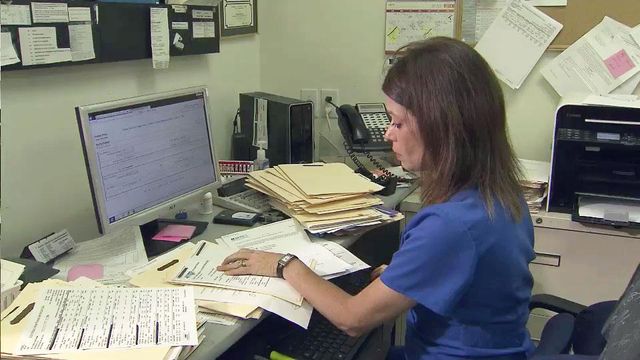After NCTracks launch, state sought to 'calm' complaints
Most medical providers agree things have improved since the state Department of Health and Human Services launched NCTracks July 1, 2013. But recently released emails from the program's rocky start show DHHS officials took action to "calm" a provider community frustrated by technical problems.
Posted — UpdatedMost medical providers agree things have improved since the state Department of Health and Human Services launched NCTracks July 1, 2013. But recently released emails from the program's rocky start show DHHS officials took action to "calm" a provider community frustrated by technical problems.
DHHS officials provided the emails in late April, almost nine months after WRAL News submitted a public records request for correspondence regarding the rollout of the NCTracks program. Exactly 11 months later, that public record request remains only partially filled.
"They are threatening to go to the media over issues like denied claims and no checkwrite payments since June," DHHS Dental Director Mark Casey wrote to colleagues on July 17.
Casey noted two of the doctors had political ties.
Dr. Jim Congleton, a pediatric dentist from New Bern, was described as "a good friend of former Governor [Bev] Perdue" and one Casey worried about most "in terms of negative press."
Casey also told DHHS leaders that Dr. Gary Oyster, a dentist in Raleigh, was "a very active contributor to NCGA members from both sides of the aisle."
The offices of both doctors, when contacted by WRAL News, said they don't think they were given special treatment. A year later, they said they're no longer having major problems with NCTracks.
A third doctor, Wilkesboro orthodontist Dr. Marvin Brame, made frequent calls to DHHS and the Dental Society and treated a large number of Medicaid patients, Casey said.
Brame's office told WRAL News he's still not happy with the system.
DHHS forwarded Casey's list to Computer Sciences Corp., the company that created the NCTracks system.
"I understand that there's a team within provider relations dealing with politically sensitive issues," DHHS spokeswoman Jane Albright said in an email to CSC workers on July 18, 2013. "The three dentists below fall into that category."
The email was copied to DHHS Chief Information Officer Joe Cooper, who said in a reply to CSC and state employees that the three dentists needed to be called that day to address their issues.
But Cooper said in an interview with WRAL News last week that he wasn't aware of any committee focusing on politically sensitive issues.
"I personally don't know of any committee like that," Cooper said.
In response to follow-up questions later, a DHHS spokesperson provided a written statement from Cooper that attributed the success of NCTracks at the one-year mark to feedback from health care associations like the Dental Society.
“DHHS works closely with many health care associations, and we take great care to resolve any issue that may arise," Cooper said in the statement. "The email you provided was the result of the communication from the N.C. Dental Society, and what is being referenced is nothing more than a way to track requests that came from associations."
CSC said the provider services team does not have a specific group for dealing with politically sensitive issues.
When rolling out the single largest IT project ever undertaken by the state, Cooper said his agency worked to help as many providers as quickly as possible.
"Every opportunity that we have to work with individual providers, it has a great outcome, but its just a matter of getting to them," Cooper said last week. "I remind people that we have 97,000 providers, and you would expect that there is always going to be a few people in 97,000 providers that still have issues. But as we get them, we address them very quickly."
Related Topics
• Credits
Copyright 2024 by Capitol Broadcasting Company. All rights reserved. This material may not be published, broadcast, rewritten or redistributed.






